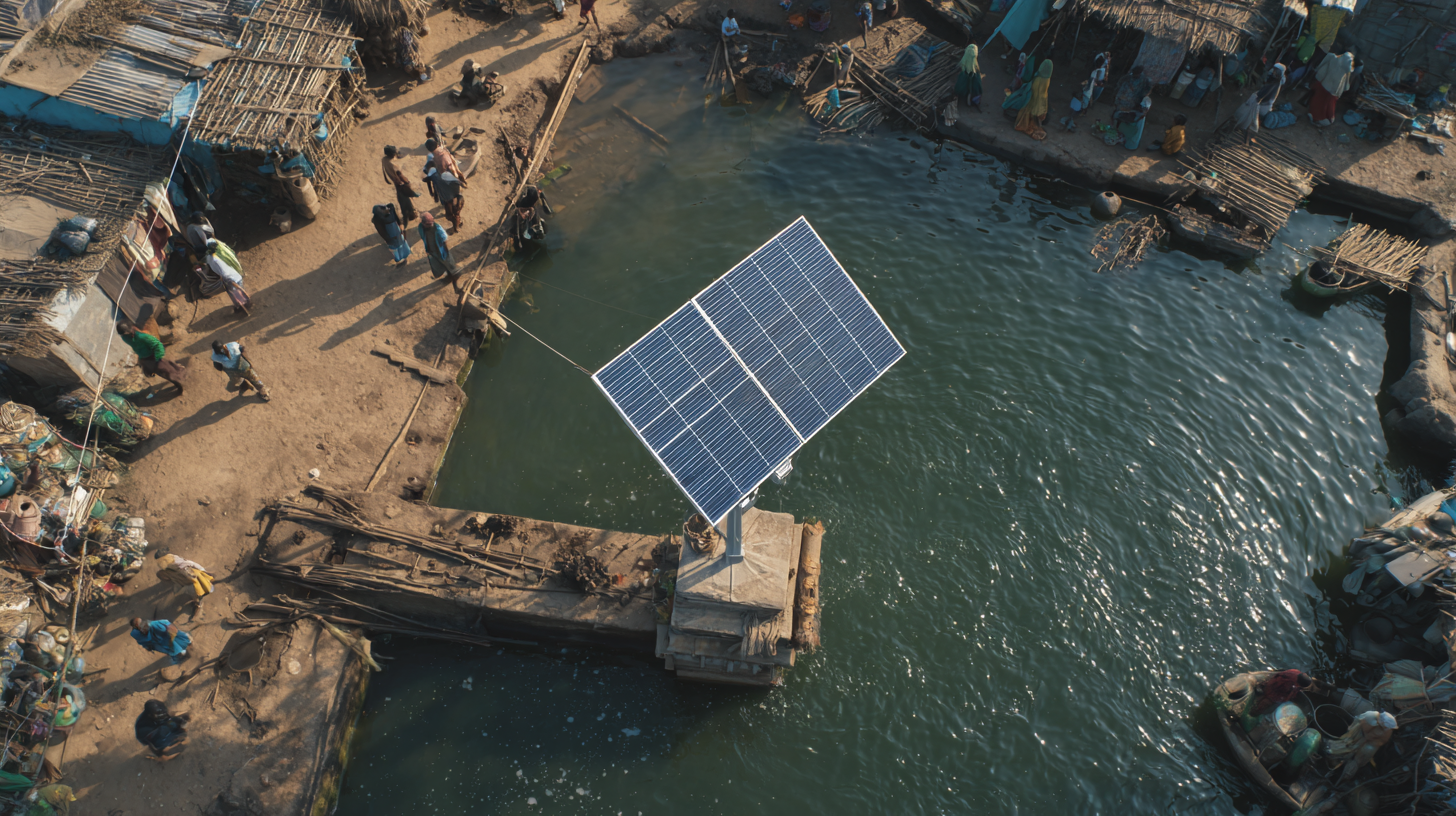Harnessing Solar Water: Innovative Solutions for Sustainable Living in the 21st Century
In the quest for sustainable living in the 21st century, harnessing solar water emerges as a pivotal solution that combines innovation with environmental responsibility. As global populations surge and traditional water resources dwindle, the need for efficient and eco-friendly methods of water supply becomes paramount. Solar water technology not only offers a renewable and abundant energy source but also promotes the utilization of water in a manner that minimizes carbon footprints and enhances resilience against climate change. This article explores various innovative strategies for utilizing solar water in everyday life, from solar water heating systems to advanced desalination techniques fueled by solar energy. By embracing these solutions, individuals and communities can significantly contribute to a sustainable future, ensuring access to clean water while preserving essential natural resources.

Innovative Solar Water Heating Technologies for Energy Efficiency
The demand for energy-efficient technologies is at an all-time high as we strive for sustainable living in the 21st century. Among these innovations, solar water heating technologies have emerged as a key player. According to the International Renewable Energy Agency (IRENA), solar thermal energy could contribute significantly to the global energy mix, potentially supplying up to 25% of global heating needs by 2050. This trend points towards the increasing viability of solar water heating systems, which harness solar energy to provide hot water for residential and commercial use.
Recent advancements in solar water heating technology have made these systems more efficient and accessible. For instance, modern evacuated tube collectors can achieve efficiency rates of over 80%. This improvement is essential for regions with less direct sunlight, where traditional systems may struggle. Additionally, innovative applications such as solar-powered heat exchangers and district heating systems are on the rise, as noted in a report by the U.S. Department of Energy. These innovations not only demonstrate the effectiveness of solar thermal solutions in enhancing energy efficiency but also pave the way for broader adoption, ultimately leading to a significant reduction in carbon emissions associated with water heating.
Harnessing Solar Water: Innovative Solutions for Sustainable Living in the 21st Century
| Technology Type | Efficiency (%) | Installation Cost ($/m²) | Operating Cost ($/year) | Lifespan (Years) |
|---|---|---|---|---|
| Flat-Plate Collectors | 50-60 | 300-800 | 150-600 | 20-30 |
| Evacuated Tube Collectors | 60-70 | 600-1200 | 100-500 | 15-25 |
| Solar Mix Heating | 45-55 | 500-1000 | 200-700 | 10-20 |
| Solar Water Pumps | 40-50 | 800-1500 | 100-300 | 20-30 |
Integrating Solar Water Systems in Urban Sustainable Design
The integration of solar water systems in urban sustainable design is crucial as cities face increasing challenges related to water scarcity and energy consumption. According to the International Renewable Energy Agency (IRENA), solar water heating technologies can reduce energy use for heating water by up to 75%, making them a viable solution for urban areas where water heating accounts for a significant portion of energy consumption. Moreover, the World Bank estimates that approximately 2.2 billion people lack access to safely managed drinking water, highlighting the dire need for innovative solutions.
Incorporating solar water systems, such as solar water heaters and solar-powered water purification systems, within urban infrastructure not only enhances energy efficiency but also promotes resilience against climate change. The Global Environment Facility (GEF) reports that implementing such technologies can lead to water savings of nearly 30% in residential areas. Furthermore, urban designs that include green roofs or integrated water management systems can optimize the collection and use of rainwater, significantly reducing the strain on municipal water supplies and contributing to sustainable urban ecosystems. This holistic approach ensures that as cities grow, they do so in a manner that is environmentally responsible and resource-efficient.

Cost-Benefit Analysis of Solar Water Solutions for Homeowners
When considering the transition to solar water solutions, homeowners often weigh the initial investment against long-term savings. A cost-benefit analysis reveals that while the upfront cost of solar water systems can be significant, the reduction in utility bills and potential tax incentives can lead to substantial savings over time. Additionally, with advancements in technology, solar water heaters have become more efficient, further enhancing their economic viability.
Tips for maximizing your investment in solar water solutions include researching local incentives and rebates that can alleviate initial costs. Furthermore, selecting a reputable installer who can provide a detailed assessment of your home’s solar potential will ensure you get the most from your system. Consider pairing your solar water heater with energy-efficient appliances and fixtures for even greater savings.
Investing in solar water systems also contributes to sustainability efforts, making it an appealing choice for environmentally conscious homeowners. By reducing reliance on fossil fuels, solar water solutions not only benefit your wallet but also support a cleaner, greener future.

Impact of Solar Water Solutions on Water Conservation Practices
As global water scarcity becomes an increasingly pressing issue, the implementation of solar water solutions emerges as a pivotal approach to enhance water conservation practices. By harnessing solar energy for water heating and purification, communities can significantly reduce their dependence on conventional energy sources while also minimizing water wastage. For instance, solar water heaters can provide hot water for domestic use, decreasing the need for energy-intensive electric heaters and subsequently lowering water consumption in heating processes.
Moreover, innovative solar-powered technologies, such as solar stills and photovoltaic water pumps, contribute to sustainable water management by utilizing renewable energy to access and treat water from various sources. These methods not only promote efficient water use but also support agricultural sustainability by providing necessary irrigation while conserving freshwater resources. By integrating solar water solutions into everyday practices, individuals and communities can play a significant role in fostering a culture of conservation, thus ensuring a more resilient and sustainable future.
Policy Frameworks Supporting Solar Water Innovations for Sustainable Development
The transition to sustainable living in the 21st century is increasingly reliant on innovative solutions, especially in the realm of solar water technologies. Policy frameworks play a pivotal role in supporting these advancements by providing incentives and regulations that encourage the integration of solar water systems into everyday life. Governments can implement subsidies for solar water heaters and establish guidelines that promote their use in both residential and commercial settings. These policies not only foster a shift toward renewable energy but also stimulate economic growth by creating jobs in the green technology sector.
Moreover, effective policy frameworks should prioritize research and development in solar water innovations. By allocating funding for scientific research and facilitating partnerships between academia and industry, governments can accelerate the emergence of cutting-edge technologies. Additionally, establishing clear standards for energy efficiency and sustainability can guide the development of solar water systems, ensuring they meet environmental goals while also being accessible to diverse communities. Through such comprehensive policies, the expansion of solar water solutions can contribute significantly to a more sustainable and resilient future.
Related Posts
-

5 Best Solar Systems that Will Power Your Home Efficiently
-

Unlocking the Advantages of Surface Water Pumps for Efficient Water Management
-

Top 10 Solar Panel Water Pump Manufacturers from China at the 137th Canton Fair
-

Unlocking Efficiency: The Advantages of Solar Panel Water Pumps for Sustainable Water Solutions
-

How to Choose the Best Solar Well Pump for Your Water Needs
-

Global Leadership in Solar Solutions Best Solar Powered Pumps from China
Contact Details
Address:
Solar Pump Solutions,
Borrisokane, Co. Tipperary, Ireland.
